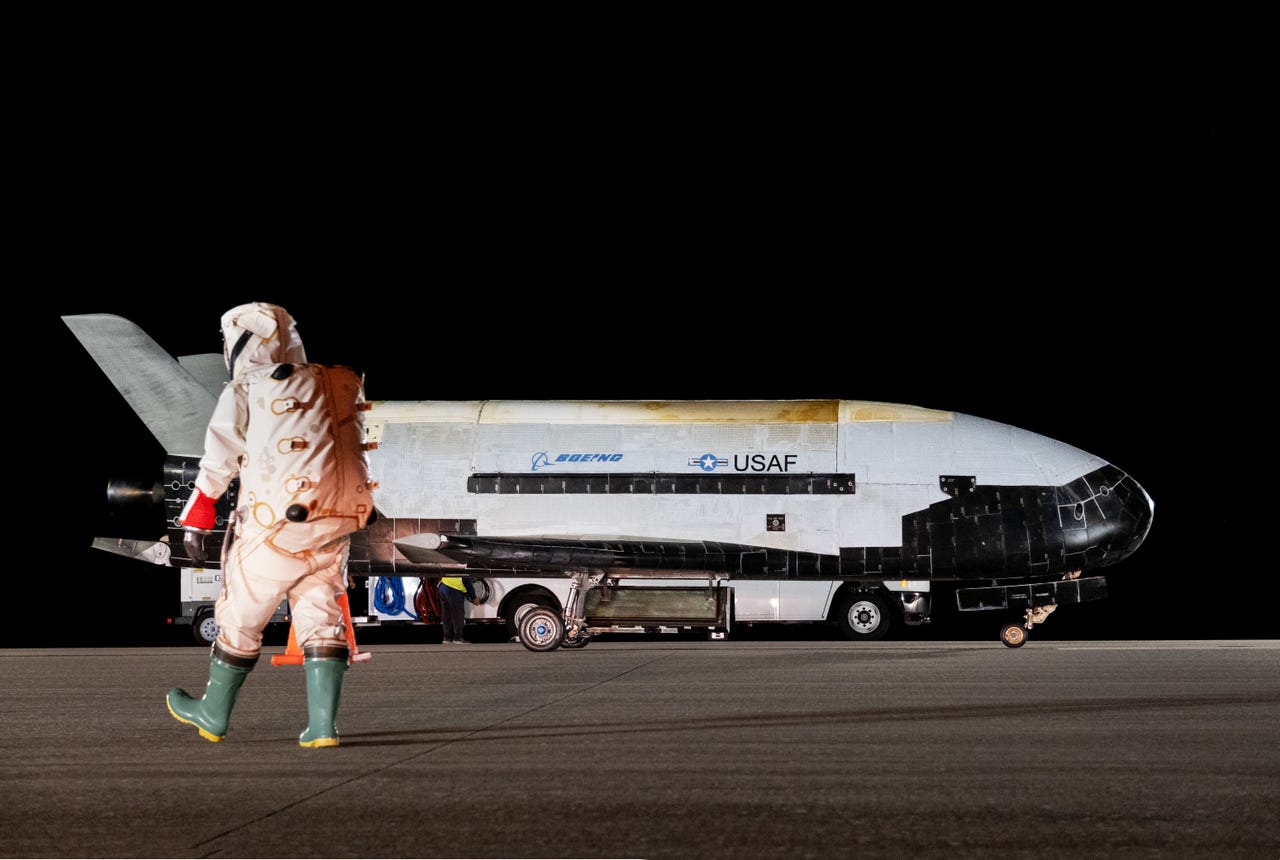































 Image: US Space Force
Image: US Space Force The mysterious reusable spaceplane, the X-37B Orbital Test Vehicle (OTV), has landed at NASA's Kennedy Space Center after orbiting Earth for 908 days.
The roughly two-and-a-half-year journey broke the spaceplane's previous record of 780 days and now means it's flown over 1.3 billion miles and 3,774 days in space. The Boeing-made spaceplane landed at NASA's Kennedy Space Center in Florida at 5:22 am ET, November 12, 2022.
This was its sixth mission since the X-37B's first launch in 2010. All of them launched from Cape Canaveral Space Force Station, Florida. The spaceplane is a partnership between the US Department of the Air Force Rapid Capabilities Office and the US Space Force. It's based on NASA's X-37 program that began in 1999 before it was handed off to DARPA in 2004.
This mission was launched on a United Launch Alliance Atlas V rocket in May 2020.
Also:NASA kicks off UFO study with 16-member team
While the Space Force hasn't revealed much about its past payloads, it revealed that it carried a FalconSat-9 that remains in orbit now and offers Academy cadets hands-on experience prior to entering active duty.
The missions also carried a service module -a ring attached to the rear of the vehicle that allows for more experiments. The module will be disposed of in coming weeks "in accordance with best practices", according to Space Force.
Experiments hosted on this sixth mission included the Naval Research Laboratory's Photovoltaic Radiofrequency Antenna Module, which harnessed solar rays outside of Earth's atmosphere and aimed to transmit power to the ground in the form of radio frequency microwave energy.
The U.S. Air Force Academy's FalconSat-8 was developed in partnership with Air Force Research Laboratory and was deployed in October 2021.
NASA experiments in this mission covered Materials Exposure and Technology Innovation in Space (METIS-2), which included thermal control coatings, printed electronic materials, and candidate radiation-shielding materials.
NASA scientists will asses the materials after they've spent over 900 days in orbit and compare observed effects to ground simulations, validating and improving the precision of space environment models, according to US Space Force.
NASA also used this mission to explore the effect of space exposure on seeds over a long period. Scientists want to know how resistant and vulnerable seeds are to space stresses, particularly radiation. This will inform space crop production for future interplanetary missions and the establishment of permanently inhabited bases in space.
"The X-37B continues to push the boundaries of experimentation, enabled by an elite government and industry team behind the scenes," said Lt. Col. Joseph Fritschen, DAF Rapid Capabilities Office's X-37B program director.
"The ability to conduct on-orbit experiments and bring them home safely for in-depth analysis on the ground has proven valuable for the Department of the Air Force and scientific community. The addition of the service module on OTV-6 allowed us to host more experiments than ever before."
Jim Chilton, senior vice president, Boeing Space and Launch, said: "Since the X-37B's first launch in 2010, it has shattered records and provided our nation with an unrivaled capability to rapidly test and integrate new space technologies."
 Tags chauds:
Innovation et Innovation
l’espace
Tags chauds:
Innovation et Innovation
l’espace